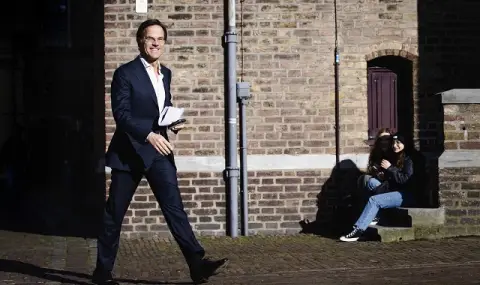New NATO chief Mark Rutte will have to harness all the coalition-building skills he was known for in Dutch politics to keep the Western alliance united amid war in Ukraine, fears over next moves of Moscow and political uncertainty in Washington.
Tomorrow, he takes over as Secretary General of the North Atlantic Treaty Organization from Norway's Jens Stoltenberg - marking the first change of the guard at the head of the alliance in a decade.
Now everything will largely depend on Rutte's ability to build consensus within the ranks of the 32-member union. The ability of this organization to protect all nearly 1 billion people living under its protection cannot rely on military power alone, it also requires political cohesion.
Challenges for Rutte are plentiful: a possible return of NATO-skeptic Donald Trump as president of the US - the dominant power in the alliance - calls from Eastern European allies to send more defense reinforcements from Russia and requests from Ukraine for more military aid.
Alliance representatives and diplomats expect Rutte to maintain Stoltenberg's priorities - mobilizing support for Kiev, persuading NATO countries to spend more on defense and preserving US commitment to European security.
Governing the Netherlands for 14 years, the 57-year-old Rutte became his country's longest-serving prime minister, during which time he also managed to become a seasoned player in the international arena.
But - although a person with the image of a welcoming and kind person - he sometimes unceremoniously criticized the governments of other countries, such as when he told Hungary to respect LGBT rights or to leave the EU, or when he questioned the rule of law in Romania and Bulgaria.
In his new role, Rutte will need the skills he developed as an architect of coalitions and head of four Dutch cabinets.
"The fact is that he is very good at finding solutions and compromises and at persuading and communicating with people - I think these are all qualities that will be quite useful to him," said Kaisa Olongren, former Dutch minister of the defense under Rütte.
Olongren and others describe him as an extremely energetic and proactive manager, which could be a problem for a hierarchical organization like NATO.
"He will never say to himself: well, I'll leave it for tomorrow,'' Olongren told Reuters.
Rutte can be kind, she said, but he can also be tough if he has to, as he did when he openly contradicted Trump at a live news conference or when he deliberately shook hands with Russian President Vladimir Putin so long during a visit to the Kremlin master in Amsterdam so that Putin could see protesters with rainbow flags.
APPROACH TO THE EAST
Rutte's baptism of fire into major international politics may have been in 2014, when Malaysia Airlines Flight 17 was shot down by a Russian missile system over eastern Ukraine, killing all 298 passengers and crew on board, including 196 Dutch nationals. . He promised to seek an account of the guilty.
In his new post, Rutte will be under pressure from NATO's Eastern European members to show that he understands their desire for greater protection from Russia and that he can provide it.
"One of the tests for him will be how far NATO's ambitions extend in terms of the eastern flank, and in particular its strengthening," said Peter Bator, who until earlier this year was Slovakia's permanent representative to the alliance .
After Russia's full-scale invasion of Ukraine, NATO increased the number of troops on the territory of the eastern members of the pact to about 10,000, who are supposed to help the armies of those countries in their defense. The alliance claims that hundreds of thousands more troops can be quickly deployed if needed.
But Eastern countries want more troops and weapons - especially air defense systems, which means convincing Western members to transfer more military assets to the East.
Since decisions in NATO are made unanimously, the influence of each Secretary General depends on how well his policy is perceived by the countries of the alliance and how well he himself is able to convince them to support it.
When you are in such a position, said Oana Lungescu, a former NATO spokesperson, "it is not enough just to look for the easiest common denominator, but also to take the alliance forward".
"This is where the subtlety of being both general and secretary comes in," said Lungescu, who now works at the Royal United Armed Forces Institute (RUSI), a British defense think tank.
MORE DEFENSE SPENDING
NATO officials and diplomats will likely have to tame his inherent Dutch-minded fixation on fiscal austerity.
At an EU summit in June, Rutte clashed with other leaders when he and German Chancellor Olaf Scholz strongly opposed joint borrowing to finance defense spending.
Polish Prime Minister Donald Tusk said that other heads of state and government "loudly reminded" to Rutte that he is soon to become head of NATO and therefore should do everything possible to ensure that governments do not skimp on defense.
The alliance estimates 23 of its 32 members will meet the target of allocating 2% of gross domestic product to military spending this year - with the Netherlands only now reaching that level despite the requirement being in place for a decade.< /p>
Many NATO representatives are of the opinion that this threshold will need to be raised further - perhaps to or even above 2.5% of GDP - in order to provide the necessary troops and armaments to implement the large-scale changes in the alliance's defense plans.
"That's a challenge for him -- to convince member states to invest more in their defense, and at a faster pace so that they can acquire capabilities that can upgrade their current defenses quite significantly,'' Bator said.
Translation from English: Vladimir Sakhatchiev, BTA
